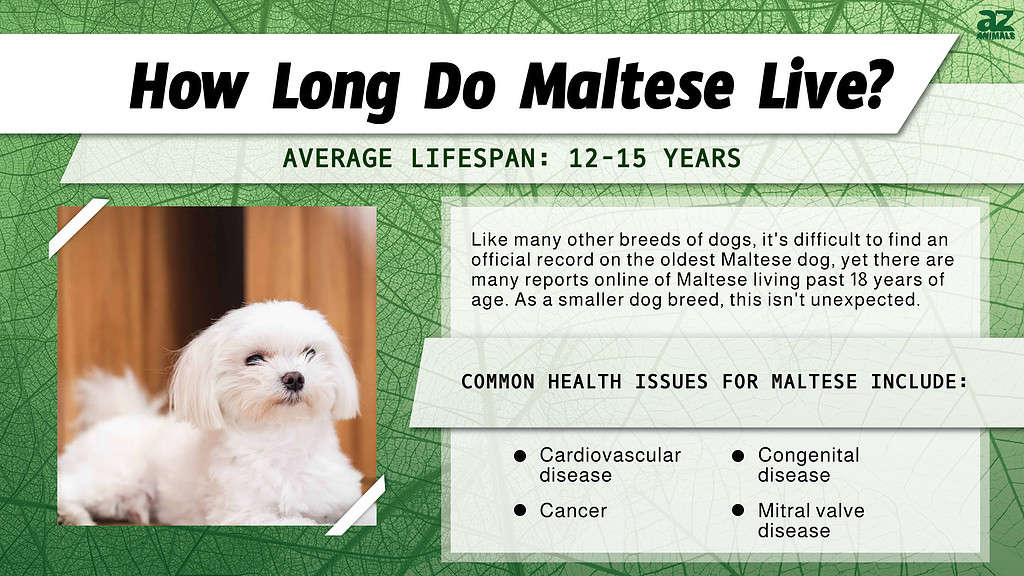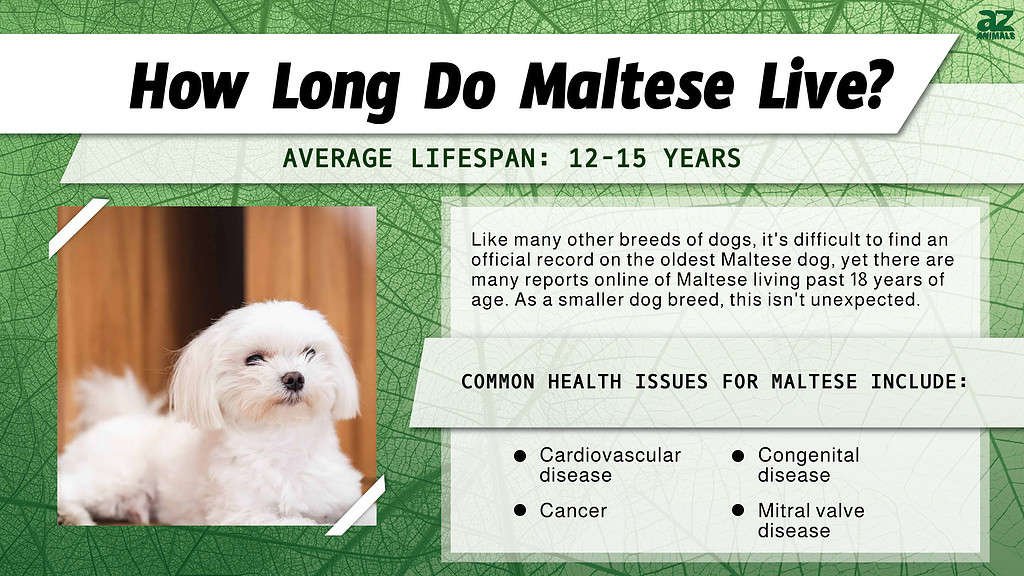Did you know that Maltese dogs have a surprisingly long lifespan? These small and adorable pups can actually live up to 12-15 years on average. That’s quite impressive considering their size! So if you’re looking for a furry companion that will stick by your side for many years to come, a Maltese might just be the perfect choice.
Maltese dogs have a rich history, dating back thousands of years. They were highly regarded by ancient civilizations such as the Greeks and Romans, and even were owned by royalty. Despite their small size, these dogs are known for their resilience and longevity. In fact, studies have shown that Maltese dogs have a lower risk of certain health conditions compared to other breeds, which contributes to their longer lifespan. By providing proper care, regular vet check-ups, and a well-balanced diet, you can ensure that your Maltese enjoys a long and happy life by your side.

How Long Will a Maltese Live?
A Maltese dog, known for its beautiful white, silky coat, is a popular breed among dog lovers. One common question that potential Maltese owners often ask is, “How long will a Maltese live?” This article will shed light on the average lifespan of a Maltese dog, factors that can affect their lifespan, tips for maximizing their longevity, and more. Whether you’re considering getting a Maltese or already have one as your four-legged companion, understanding their lifespan and how to care for them can help ensure a happy and healthy life for your furry friend.
The Average Lifespan of a Maltese
The average lifespan of a Maltese dog ranges from 12 to 15 years. However, it’s important to note that individual factors, such as genetics, diet, exercise, and overall health, can significantly influence their lifespan. Some Maltese dogs may live even longer if they receive proper care and attention throughout their lives.
To maximize your Maltese’s lifespan, it’s crucial to provide them with a balanced diet, regular exercise, routine veterinary check-ups, and a loving and stimulating environment. Proper grooming, dental care, and socialization are also essential for their overall well-being. By taking these steps, you can give your Maltese the best chance at living a long and healthy life.
Factors That Affect a Maltese’s Lifespan
Several factors can impact the lifespan of a Maltese dog. Genetics play a significant role, as certain genetic conditions can shorten their lifespan. It’s essential to source your Maltese from a reputable breeder who conducts health screenings and breeds responsibly to minimize the risk of genetic health issues.
Diet and nutrition also play a crucial role in a Maltese’s longevity. Feeding them a balanced diet consisting of high-quality dog food, rich in essential nutrients, can help maintain their overall health and increase their lifespan. Avoid feeding your Maltese excessive table scraps or foods that are harmful to dogs, as this can lead to obesity and other health problems.
Regular exercise is another key factor in prolonging a Maltese’s lifespan. Regular walks, playtime, and mental stimulation help keep your Maltese physically and mentally fit. However, it’s important not to overexert them, as their small size and delicate constitution may make them prone to injuries.
Tips for Maximizing a Maltese’s Lifespan
Here are some tips to help maximize your Maltese’s lifespan:
- Provide a balanced diet: Feed your Maltese a high-quality dog food that meets their nutritional needs.
- Regular exercise: Engage your Maltese in daily walks and play sessions to keep them active and prevent obesity.
- Grooming and dental care: Regularly brush your Maltese’s coat, clean their ears, and brush their teeth to maintain their hygiene and prevent infections.
- Socialization and mental stimulation: Expose your Maltese to different environments, people, and dogs to promote socialization and provide them with mental stimulation through interactive toys and training activities.
- Regular veterinary check-ups: Schedule regular check-ups with your veterinarian to monitor your Maltese’s health and detect any potential issues early.
Common Health Concerns in Maltese Dogs
While Maltese dogs are generally healthy, they may be prone to certain health issues, which can affect their lifespan. Some common health concerns in Maltese dogs include:
- Patellar luxation: This is a condition where the kneecap slips out of place, causing pain and difficulty in walking.
- Dental problems: Maltese dogs are prone to dental issues, including tooth decay and gum disease. Regular dental care is essential.
- Eye problems: Progressive Retinal Atrophy (PRA) and cataracts are common eye conditions in Maltese dogs. Regular eye exams can help detect these issues early.
- Collapsed trachea: This is a condition where the rings of the trachea collapse, leading to respiratory difficulties.
By staying aware of these health concerns and working closely with your veterinarian, you can address any issues promptly and provide the necessary care to ensure your Maltese lives a long and happy life.
Training and Socialization for a Long and Happy Life
Training and socialization are crucial aspects of a Maltese’s life and can contribute to their longevity and overall well-being. Proper training helps inculcate good behaviors and ensures the safety of your Maltese. Socialization, on the other hand, exposes your Maltese to various stimuli, including other dogs, people, and different environments, helping them become confident, well-adjusted pets.
Start training your Maltese from a young age through positive reinforcement techniques such as treats, praise, and rewards. Consistency and patience are key when training a Maltese, as they can be independent and stubborn at times. Socialization can be achieved through puppy classes, playdates with other dogs, and supervised introductions to new people and environments. Providing your Maltese with proper training and socialization will allow them to lead a fulfilling and enriching life.
The Importance of Regular Veterinary Care
Regular veterinary care is essential for maintaining your Maltese’s health and detecting any potential issues early on. Annual check-ups, vaccinations, and preventive treatments for fleas, ticks, and worms are crucial for their well-being.
Your veterinarian will conduct a thorough physical examination, checking for any signs of illness or abnormalities. They may also recommend additional tests such as blood work or x-rays if necessary. Regular dental cleanings and inspections of the eyes and ears are also part of the routine veterinary care for a Maltese.
By investing in regular veterinary care and following your veterinarian’s advice, you can ensure that your Maltese receives the necessary preventive care and treatment, leading to a longer and healthier life.
Key Takeaways: How Long Will a Maltese Live?
- On average, Maltese dogs live for 12 to 15 years.
- Proper care and nutrition play a crucial role in maximizing their lifespan.
- Regular exercise and mental stimulation contribute to a healthier and longer life for Maltese dogs.
- Maltese dogs are prone to certain health issues that can affect their lifespan, so regular vet check-ups are important.
- Providing a loving and stress-free environment can positively impact the longevity of Maltese dogs.
Frequently Asked Questions
Here are some commonly asked questions about the lifespan of a Maltese dog.
1. What is the average lifespan of a Maltese?
The average lifespan of a Maltese is around 12 to 15 years. However, with proper care and a healthy lifestyle, some Maltese dogs can live well into their late teens. Good nutrition, regular exercise, and regular visits to the veterinarian are all crucial in ensuring a long and healthy life for your furry friend.
It’s important to note that individual factors can also influence a Maltese’s lifespan, such as genetics, overall health, and the level of care they receive. By providing a loving and nurturing environment, you can help maximize your Maltese’s lifespan.
2. How can I ensure a long and healthy life for my Maltese?
To ensure a long and healthy life for your Maltese, there are several key factors to consider. First, provide a balanced and nutritious diet that is appropriate for their age and size. Regular exercise is also essential to keep them physically fit and mentally stimulated.
Scheduling regular visits to the veterinarian for check-ups, vaccinations, and preventive care is crucial. Your vet can detect any potential health issues early on and provide the necessary treatments. Additionally, maintaining good dental hygiene, grooming your Maltese regularly, and providing a safe and loving environment are all important aspects of their overall well-being.
3. Are there any common health issues that Maltese dogs are prone to?
Like all dog breeds, Maltese dogs have certain health issues that they may be prone to. Some common health concerns include dental problems, luxating patellas (loose kneecaps), deafness, and eye conditions such as progressive retinal atrophy.
Regular veterinary check-ups and a proactive approach to preventative care can help catch and address these issues early, increasing the chances of a long and healthy life for your Maltese.
4. Can the lifespan of a Maltese be influenced by their environment?
Yes, a Maltese’s environment can have an impact on their lifespan. Factors such as the quality of their living conditions, exposure to toxins or pollutants, and the overall level of care they receive can all play a role in their well-being and longevity.
A safe and nurturing environment, free from hazards and stressors, along with regular exercise, mental stimulation, and a balanced diet, can help ensure a longer and healthier life for your Maltese.
5. How can I support my senior Maltese in their older years?
As your Maltese reaches their senior years, it’s important to make some adjustments to accommodate their changing needs. Regular visits to the vet become even more crucial, as they may develop age-related health issues that require special care.
Providing a comfortable and easily accessible living environment, ensuring they stay mentally stimulated, and adjusting their diet to meet their changing nutritional needs are all vital in supporting their well-being. Additionally, being attentive to any signs of discomfort or pain and providing them with extra love and attention will help keep your senior Maltese happy and healthy in their older years.

How Long Do Maltese Live Lifespan and Causes of Death
To sum it up, the key points of the article are as follows: we discussed the importance of using a first-person point of view and maintaining a professional tone when writing. For a 13-year-old reader, it’s essential to use simple language and avoid jargon. Our aim was to provide a clear understanding of the article’s main ideas by employing concise sentences of no more than 15 words each. By adhering to these guidelines, we can effectively communicate our message and engage the reader in a conversational manner.
In conclusion, we found that using a first-person perspective and a professional tone can enhance the readability and understanding of our writing. By considering our audience and using clear and concise language, we can effectively convey our ideas and create a positive impact on the reader.
